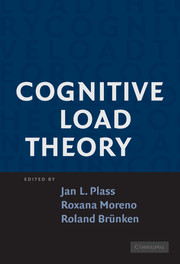Book contents
- Frontmatter
- Contents
- Contributors
- COGNITIVE LOAD THEORY
- Introduction
- PART ONE THEORY
- PART TWO EMPIRICAL EVIDENCE
- 5 Learning from Worked-Out Examples and Problem Solving
- 6 Instructional Control of Cognitive Load in the Design of Complex Learning Environments
- 7 Techniques That Reduce Extraneous Cognitive Load and Manage Intrinsic Cognitive Load during Multimedia Learning
- 8 Techniques That Increase Generative Processing in Multimedia Learning: Open Questions for Cognitive Load Research
- PART THREE DISCUSSION
- Index
- References
6 - Instructional Control of Cognitive Load in the Design of Complex Learning Environments
Published online by Cambridge University Press: 05 June 2012
- Frontmatter
- Contents
- Contributors
- COGNITIVE LOAD THEORY
- Introduction
- PART ONE THEORY
- PART TWO EMPIRICAL EVIDENCE
- 5 Learning from Worked-Out Examples and Problem Solving
- 6 Instructional Control of Cognitive Load in the Design of Complex Learning Environments
- 7 Techniques That Reduce Extraneous Cognitive Load and Manage Intrinsic Cognitive Load during Multimedia Learning
- 8 Techniques That Increase Generative Processing in Multimedia Learning: Open Questions for Cognitive Load Research
- PART THREE DISCUSSION
- Index
- References
Summary
Recent instructional design theories (e.g., the case method, project-based education, problem-based learning, and competence-based education) tend to focus on authentic learning tasks that are based on real-life experiences as the driving force for complex learning (Merrill, 2002; van Merriënboer & Kirschner, 2001). According to these theories, authentic learning tasks have many solutions, are ecologically valid, cannot be mastered in a single session, and pose a very high load on the learner's cognitive system. Consequently, complex learning has little to do with learning separate skills in isolation, but foremost it deals with learning to coordinate the separate skills that constitute real-life task performance. Thus, in complex learning, the whole is clearly more than the sum of its parts, because it also includes the ability to coordinate the parts. In addition, in complex learning, effective performance relies on the integration of skills, knowledge, and attitudes, where, for instance, complex knowledge structures are underlying problem-solving and reasoning skills and particular attitudes are critical to interpersonal skills or to performing safety procedures. Moreover, complex learning requires differentiation by recognizing qualitative differences among the task characteristics that influence the constituent skills that have to be applied. Figure 6.1 shows an example of a simulated, authentic learning task for novice electricians in vocational education, namely, troubleshooting electrical circuits.
Information
- Type
- Chapter
- Information
- Cognitive Load Theory , pp. 109 - 130Publisher: Cambridge University PressPrint publication year: 2010
References
Accessibility standard: Unknown
Why this information is here
This section outlines the accessibility features of this content - including support for screen readers, full keyboard navigation and high-contrast display options. This may not be relevant for you.Accessibility Information
- 10
- Cited by
